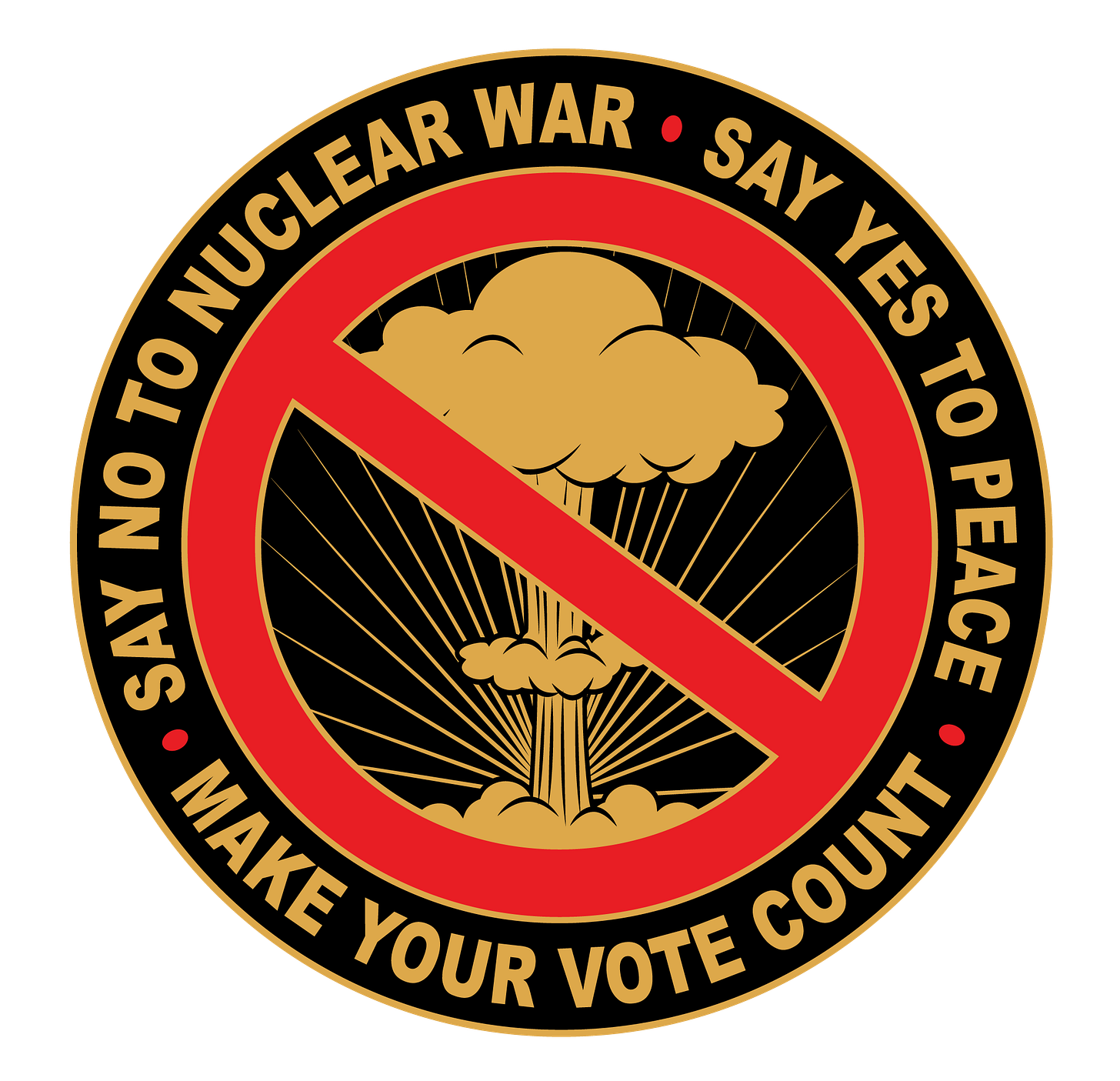Operation DAWN Update: A Vote Earned, not Given
Make your vote count in November, and save the world in the process
As America wrestles with the question of who will emerge victorious from the three-ring circus that is the 2024 Presidential election, there is increasing talk about the existential nature of this election and the role played by the two primary candidates—the presumptive nominee of the Democratic Party, Kamala Harris, and her challenger, the Republican Party nominee, Donald Trump—in taking the nation to the brink when it comes to the future of American democracy as an institution. The choices couldn’t be starker—the living embodiment of “DEI establishment politician” (Harris) versus the textbook definition of a “populist political outsider” (Trump).
In many ways, the rhetoric about the critical nature of the 2024 Presidential race isn’t exaggerated—in terms of sustained political viability, the stakes couldn’t get any higher. A Harris victory would effectively end the MAGA movement, since it is largely a populist exercise built around the cult of personality that has surrounded Donald Trump, whom most people agree is running his last political race. A Trump victory, however, would project into the political mainstream his running mate, J.D. Vance, who would be given the opportunity to claim the MAGA throne in 2028, setting up the potential for a 12-year MAGA run which could very well spell the end of establishment politics in America as we know it.

America has gone through numerous presidential contests in its 248-year history in which the essence of the nation could be said to be at stake. The first of these took place in 1800, when Thomas Jefferson defeated John Adams in a race that literally decided the future of the United States by ending the conservative Federalist hold on political power and replacing it with the more progressive Democrat-Republican party. Andrew Jackson’s 1828 victory over John Quincy Adams saw the reemergence of the Federalist ideology in the form of the new Democratic Party prevail over Adams and the Republicans in an election that served as the foundation for the emergence of the two-party system that dominates American politics until today. And the 1860 election, won by Abraham Lincoln, literally carried with it life or death decisions which propelled America into a Civil War. It is the only American election which can genuinely be described as existential in terms of its consequences.
The point to be made here is that no matter what anyone says about 2024, while the future direction of American politics, and the societal issues thus manifested, will be decided in November, the existential fate of the United States is not on the line.
Neither is the fate of “American democracy.”
The 2024 Presidential race, however, does directly impact the existential survival of the United States, the American people, and indeed the entire world, but not because of its outcome. The harsh reality is that regardless of who among the two major candidates wins in November, American policy vis-à-vis Russia, especially when it comes to nuclear posture and arms control, is hard-wired to achieve the same result. And it is this result that seals the fate of all humanity unless a way can be found to prompt a critical re-think of the underlying policies that produce the anticipated outcome.
A future Harris administration is on track to continue a policy which commits to the strategic defeat of Russia, the lowering of the threshold for the use of nuclear weapons in Europe, the termination of the last remaining arms control treaty (New START) in February 2026, and the re-deployment of intermediate-range missiles into Europe, also in 2026.
Donald Trump, meanwhile, has proffered rhetoric which has led many to believe he would end the conflict in Ukraine, and thereby open the door for better relations with Russia. But this policy is predicated on the concept of the “perfect phone call” between Trump and Russian President Vladimir Putin where the Russian leader accedes to American-dictated terms regarding Ukraine which would fall far short of Russia’s stated goals. Trump has made it clear that if Putin fails to bend the knee on Ukraine, he will then flood Ukraine with weapons—basically the Biden policy of strategically defeating the Russians on steroids. It was Trump who pulled out of the INF treaty in 2019, and as such put in motion the policy direction which has US INF weapons returning to Europe in 2026. And Trump is not a fan of arms control treaties, so the notion that he would save New START or replace it with a new treaty vehicle is mooted by reality.
No matter who wins among the two major candidates in November, the United States is on track for a major existential crisis with Russia in Europe sometime in 2026. The re-introduction of INF-capable systems by the US will trigger a similar deployment by Russia of nuclear-capable INF systems targeting Europe. Back in the 1980’s, the deployment of INF systems by the US and Russia had created an inherently destabilizing situation where one mistake could have set off a nuclear war. The experience of Able Archer ’83, a NATO command and control exercise that took place in the fall of 1983, bears witness to this reality. The Soviets interpreted the exercise as being a cover for a nuclear first-strike by NATO and put its nuclear forces on high alert. There was no room for error—one miscalculation or misjudgment could have led to a Soviet decision to pre-empt what it believed to be an imminent NATO nuclear attack, thereby triggering a full-scale nuclear war between the US and the Soviet Union.
The INF treaty, signed in 1987, removed these destabilizing weapons from Europe. But now that treaty is no more, and the weapons that brought Europe and the world to the brink of destruction in the 1980’s are returning to a European continent where notions of peaceful coexistence with Russia have been replaced with rhetoric promoting the inevitability of conflict.
When one combines the existence of a policy objective (the strategic defeat of Russia) which, when coupled with a policy of supporting a Ukrainian victory over Russia predicated on Ukraine regaining physical control over Crimea and the four territories of New Russia (Kherson, Zaporizhia, Donetsk, and Lugansk), one already has a recipe for disaster, since this policy, if successful, would automatically trigger a Russian nuclear response, since doctrinally nuclear weapons would be used to respond to any non-nuclear scenario where the existential survival of Russia is at stake. (The loss of Crimea and the New Territories is like the United States losing Texas, California, or New York—a literal existential situation.)
Add to this the end of arms control as we know it come February 2026, when the New START treaty expires. The Biden administration has declared that it will seek to add new nuclear weapons “without limitation” once the New START caps on deployed weapons expires—the literal definition of an arms race out of control. One can only imagine that Russia would be compelled to match this rearmament activity.
And finally, the recent agreement by the US and Germany to redeploy intermediate-range missiles on European soil in 2026, and Russia’s decision to match this action by building and deploying its own intermediate-range missiles, recreates the very situational instability which threatened regional and world security back in the 1980’s.
When one examines these factors in their aggregate, the inescapable conclusion is that Europe will be faced with an existential crisis which could come to a head as early as the summer of 2026. The potential for the use of nuclear weapons, either by design or accident, is real, creating a situation that exceeds the Cuban Missile Crisis in terms of the risk of a nuclear war by an order of magnitude or more.
While a future nuclear conflict would very likely start in Europe, it will be virtually impossible to contain the use of nuclear weapons on the European continent. Any use of nuclear weapons against Russian soil, or the territory of its ally, Belarus, would trigger a general Russian nuclear response which would lead to a general, global-killing nuclear war.
The question Americans confront today is what to do about this existential threat to their very survival.
The answer put forward here is to empower your vote in the coming presidential election by tying it not to a person or party, but rather a policy.
In short, empower your vote by pledging it to the candidate who will commit to prioritizing peace over war, and who pledges to make the prevention of nuclear war, not the promotion of nuclear weapons, the cornerstone of his or her national security policy.
Don’t give your vote away by committing to a candidate at this early stage—when you do this, you no longer matter, as the candidates will simply turn their attention to those uncommitted voters in an effort to win them over.
Make the candidates earn your vote by linking it to a policy posture that reflects your core values.
And this election, your core value should be exclusively centered on promoting peace and preventing nuclear war.
Such a policy posture would be built upon for basic pillars.
1. Immediately end the current declaratory policy of the United States which articulates the strategic defeat of Russia as a primary US objective and replace it with a policy statement which makes peaceful coexistence with Russia the strategic goal of US foreign and national security policy. Such a policy redirection would include, by necessity, the goal of rethinking European security frameworks which respect the legitimate national security concerns of Russia and Europe, and would incorporate the necessity of a neutral Ukraine.
2. A freeze on the re-deployment of INF-capable weapons systems into Europe, matched by a Russian agreement not to re-introduce INF-capable weapons into its arsenal, with the goal of turning this freeze into a formal agreement that would be finalized in treaty form.
3. A commitment to engage with Russia on the negotiation and implementation of a new strategic arms control treaty which seeks equitable cuts in the strategic nuclear arsenals of both nations, a reduction in the number of nuclear weapons each side can retain in storage, and which incorporates limits on ballistic missile defense.
4. A general commitment to work with Russia to pursue verifiable and sustainable nuclear arms reduction globally using multi-lateral negotiations.
I will be working with Gerald Celente, Judge Andrew Napolitano, Garland Nixon, Wilmur Leon, Max Blumenthal, Anya Parampil, Jeff Norman, Danny Haiphong, and many others to put together an event, Operation DAWN, on September 28, 2024. The goal of this event will be to get as many American citizens as possible to tie their vote to the policy posture spelled out above, and then to leverage these commitments in a way that compels all candidates for the presidency to articulate policies that meet this criterion.
In doing so, the voter would be fighting for a chance to save democracy by making his or her vote count, save America and the world by creating the possibility to avert nuclear conflict, all by making the candidates for presidency earn their vote, as opposed to simply giving it away.
Operation DAWN is still in the preliminary planning stages. More details will be published here as the planning progresses.





I invited Jill to be a part of this.
She declined.
Normally, Scott, you are very reality based. Not this time. The reality is this: All the actions that brought us to this brink were deliberately initiated by the US, not Russia, not China. There is not one single candidate that has the characteristics you describe. Not one. Hell's Bells There isn't a single candidate that has ANY of the characteristics you describe. You can't ask me to pledge my vote to someone who doesn't exist.